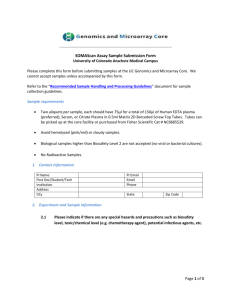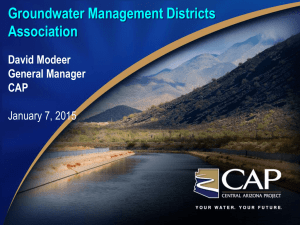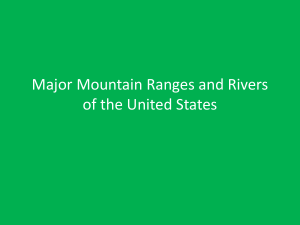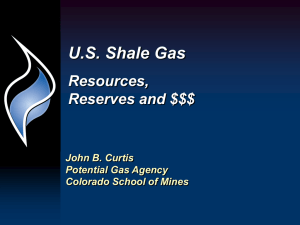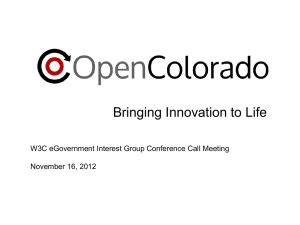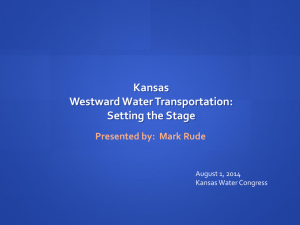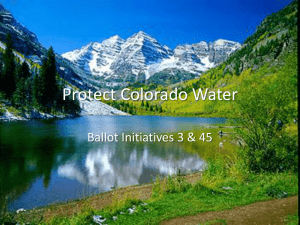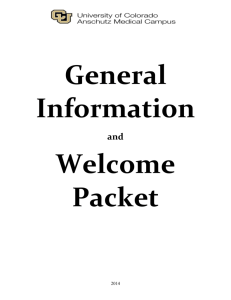Branding 101 Presentation for CAC
advertisement
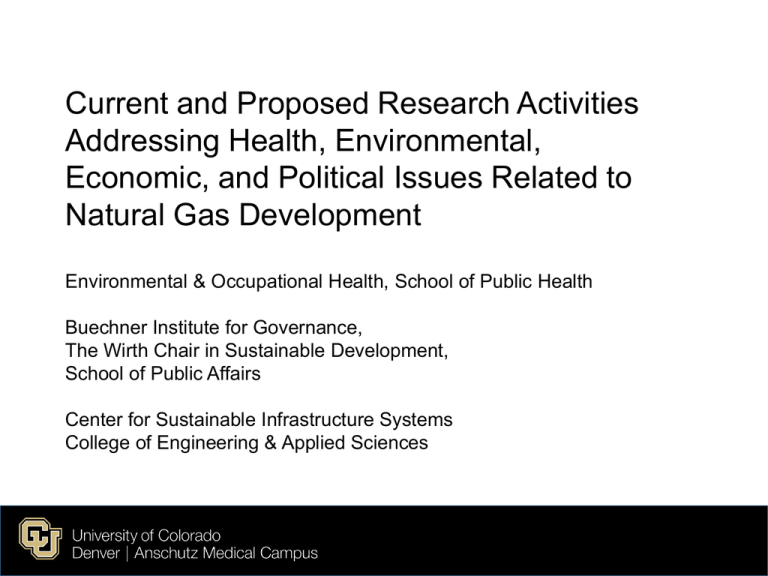
Current and Proposed Research Activities Addressing Health, Environmental, Economic, and Political Issues Related to Natural Gas Development Environmental & Occupational Health, School of Public Health Buechner Institute for Governance, The Wirth Chair in Sustainable Development, School of Public Affairs Center for Sustainable Infrastructure Systems College of Engineering & Applied Sciences Department of Environmental & Occupational Health Colorado School of Public Health Completed Research Health Impact Assessment for Battlement Mesa, Garfield County Colorado, Feb. 2011 – A broad assessment of potential health effects associated with possible chemical, safety and community exposures related to a proposed 200 well natural gas project in a residential community in Western Colorado. • Recommendations for project modifications were provided as a means for reducing exposures before they occur. The goal is to prevent health effects rather than respond to them. Environmental and Health Monitoring Study, Final Designs, Dec. 2011 – 5 study designs aimed at filling scientific information gaps identified in the HIA. • Three designs focus on characterizing chemicals emitted in to the air at all stages of natural gas development and production, and developing emission factors and models of dispersion as well as ongoing monitoring of air, water and soil. • Two designs focus on monitoring physical, psychosocial and community health in people living in areas of natural gas development. Proposed Research Natural Gas Well Completion Emission Profiles in Garfield County, Colorado – Grant proposal submitted to the EPA May, 2011 – Based on two of the study designs looking at air emissions, mentioned above. Although scored favorably, it was withdrawn by CDPHE due to inability to negotiate sites for sampling. Adverse Birth Outcomes and Natural Gas Development – Grant proposal submitted to the NIH (Environmental Sciences Division) October, 2011. – Will evaluate the association between birth defects, low birth weight and prematurity and proximity to natural gas wells. Publications • Potential Exposure-Related Human Health Effects of Oil and Gas Development: A White Paper, 2008. – A preliminary review of possible chemical exposures and health effects of natural gas development. • Potential Exposure-Related Human Health Effects of Oil and Gas Development: A Literature Review, 2008 – A review of the medical literature for chemicals potentially emitted by natural gas development processes. • Human Health Risk Assessment of Air Emissions from Development of Unconventional Natural Gas Resources; manuscript submitted for peer review publication – Describes the Health Risk Assessment conducted as part of the HIA. • Health Impact Assessment: Promoting Public Health through Stakeholder Engagement in a Community Facing Natural Gas Development; manuscript submitted for peer review publication – Describes the HIA process and results as a tool to promote public health. Conference • Mountain and Plains Education and Research Center Energy Summit: Promoting Occupational Health: Recognizing and Controlling Risks during Natural Gas Development and Production, April 12, 2012 – Will bring together researchers, engineers, industry experts, occupational health and safety professionals to discuss and share strategies for evaluating the risks, solutions and research areas that will enable natural gas exploration and production companies to reduce potentially hazardous exposures to their employees. Researchers • • • • • • Roxana Witter, MD, MSPH John Adgate, PhD, MSPH Lee Newman, MD, MS Lisa McKenzie, PhD, MPH Kaylan Stinson, MPH Ken Scott, MPH For more information contact – Roxana Witter: roxana.witter@ucdenver.edu Buechner Institute for Governance School of Public Affairs Research Underway The Impacts of Hydraulic Fracturing and Shale Gas Development on Local Governments – With the National Association of Regional Councils – Survey regional council members and local decision makers from CO, WY, TX, OH, PA, NY, WV, and NC • Identify key topics of concerns of different regional and community types • Describe the current corresponding policy solutions – How do rural and urban policy approaches to managing hydraulic fracturing and subsequent gas extraction compare? – Does a state’s regulatory and tax structure influence the local governments’ approach to and management of the industry? – Provide a baseline report to guide future research focused on improving regional outcomes of shale gas development Researchers • Dr. Brian Gerber, Associate Prof. & Exec. Director • Samuel Gallaher, Ph.D. Student • Jennifer Kagen, M.P.A. Student For more information contact – Brian Gerber: brian.gerber@ucdenver.edu Center for Sustainable Infrastructure Systems College of Engineering & School of Public Affairs Proposed Research Measuring & Communicating the Environmental and Economic Benefits/Costs of Natural Gas Production in Colorado Part I: – Evaluate trade-offs between water use, energy efficiency, carbon emissions, economic benefits/costs and public health benefits/costs at natural gas production locations in Colorado using production technology improvements (e.g., multi-well pads) and consumption locations (Colorado households overall). • Evaluate tradeoffs against other fuels and technologies both conventional and next generation renewables • Utilize expertise in Life Cycle Assessment, Carbon Footprinting and Water-Footprinting developed in CSIS NSF IGERT grant (Research Underway) Proposed Research Measuring & Communicating the Environmental and Economic Benefits/Costs of Natural Gas Production in Colorado. Part II: – Share the metrics and analytic information developed in Part I in a participatory dialogue with citizens, the gas industry and policy actors – Conduct outreach with the community on sustainability planning by integrating energy, water, health and economic development objectives and quantifying job creation and business development – Utilize participatory research model published in Ramaswami et al. 2011 and tested in 4-5 Colorado cities Publications • Chavez, A.; Ramaswami, A. “Progress toward Low Carbon Cities: Approaches for Trans-boundary GHG Emissions’ Footprint-ing.” Carbon Management, 2(4):471-482, 2011 • Ramaswami, A.; Main, D.; Bernard, M.; Chavez, A.; Davis, A.; Thomas, G.; Schnoor, K. “Planning for low-carbon communities in US cities: a participatory process model between academic institutions, local governments and communities in Colorado.” Carbon Management, 2(4):397-411, 2011 • Hillman, T.; Ramaswami, A. “Greenhouse Gas Emission Footprints and Energy Use Metrics for Eight US Cities”, Environmental Science & Technology, 44: 1902-1910, 2010 Researchers • Dr. Anu Ramaswami, Professor Environmental Engineering & Director, CSIS • Alice Madden, Wirth Chair in Sustainable Development • Dr. Tanya Heikkila, Associate Professor, School of Public Affairs • Dr. Brian Gerber, Associate Professor & Director, BIG • Dr. Debbi Main, Professor, Health & Behavioral Sciences For more information contact: – Anu Ramaswami: anu.ramaswami@ucdenver.edu School of Public Affairs Proposed Research Studying the Political Context of US Shale Gas Development Objectives: – Identify the actors politically involved in US shale gas development and their attributes (e.g., beliefs, networks) – Examine actions and strategies used by coalitions to influence policy. – Identify factors conducive for learning. – Identify areas of common ground and future likelihood of policy change. Proposed Research Studying the Political Context of US Shale Gas Development Approach – Focus on three shale formations – Interviews & surveys – Narrative analysis of media – Virtual network analysis Researchers • Dr. Tanya Heikkila, Associate Professor – Contact: tanya.heikkila@ucdenver.edu • Dr. Chris Weible, Associate Professor – Contact: chris.weible@ucdenver.edu Thank You
